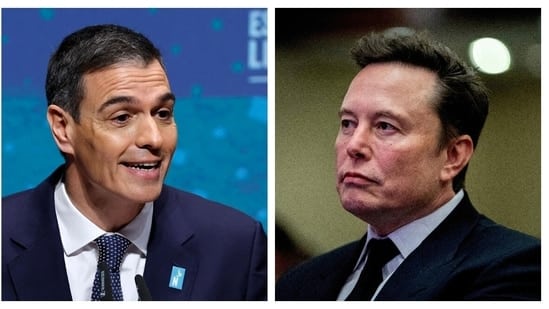Spain’s Prime Minister Pedro Sánchez has strongly criticized Elon Musk, accusing the billionaire entrepreneur of inciting hate and undermining democratic institutions. Sánchez’s remarks were made in response to Musk’s controversial statements and actions on social media, which have sparked significant backlash across Europe.
During a speech in Madrid on Wednesday, Prime Minister Sánchez described Musk, the owner of the social media platform X, as someone who “openly attacks our institutions” and “stirs up hatred.” Sánchez’s criticism comes at a time when Musk’s influence on political discourse in Europe has become increasingly pronounced, particularly in his interactions with European leaders and political figures.
Musk, who has gained prominence as a supporter of former U.S. President Donald Trump, has recently directed his ire towards leaders in Europe, including German Chancellor Olaf Scholz and UK Prime Minister Keir Starmer. His remarks have drawn strong condemnation from various quarters, with many accusing him of using his platform to spread divisive rhetoric.
The latest controversy arose when Musk shared a retweet from La Razón, a right-wing Spanish newspaper, which claimed that 91 percent of rapes in Catalonia were committed by foreigners. The headline, which was widely criticized for its inflammatory and misleading nature, quickly drew reactions from political figures across Spain, including Catalonia’s Socialist president, Salvador Illa. Illa firmly rejected the narrative, stating, “We will not allow anyone to use the name of Catalonia to spread hate speech.” His comments reflected the widespread concern about the impact of such statements on societal cohesion.
Prime Minister Sánchez, in his address, took the opportunity to expand on the broader implications of Musk’s actions. He accused the tech mogul of leading an “international reactionary” movement that is actively working to “undermine democracy.” Sánchez warned that Musk’s rhetoric, which aligns with far-right and extremist ideologies, is fueling a rise in hate speech and extremism not just in Spain but across Europe. He further condemned Musk’s recent support for far-right political parties, particularly in Germany, where the billionaire has voiced strong backing for the Alternative for Germany (AfD) party.
Musk’s involvement with the AfD has sparked outrage in both Germany and Spain, as the party is known for its extreme-right views and anti-immigrant stance. Ahead of Germany’s upcoming snap elections, Musk is scheduled to host a discussion on X with Alice Weidel, the AfD’s leader. The timing of this event has been seen as particularly contentious, as Weidel and the AfD are often associated with promoting xenophobic and anti-democratic rhetoric.
The prime minister also raised concerns about Musk’s role in amplifying far-right ideologies in other parts of Europe. He specifically pointed to Musk’s outspoken support for Tommy Robinson, a British far-right figure known for his anti-Muslim views. Robinson’s release from prison was a cause Musk had publicly championed, further intensifying criticism of the billionaire’s political leanings.
Sánchez, speaking during the official commemorations for the 50th anniversary of dictator Francisco Franco’s death, warned that Musk’s actions represent a significant challenge to democratic values. The commemorations were held at Madrid’s Reina Sofia Museum, home to Picasso’s iconic anti-Franco painting “Guernica,” which served as a stark reminder of the authoritarian regime that once ruled Spain. Sánchez used the occasion to reflect on the ongoing threat posed by forces that seek to destabilize democratic institutions, suggesting that Musk’s growing influence on the global political stage is part of a wider global trend.
The Prime Minister’s comments come amid growing concerns over the role of social media in spreading hate speech and radicalizing political discourse. Platforms like X (formerly Twitter) have faced increasing scrutiny over their role in amplifying extremist views, with critics accusing Musk of allowing the platform to become a haven for far-right voices. While Musk has defended his management of X as a commitment to free speech, his critics argue that the platform’s policies have created a fertile ground for the spread of harmful rhetoric.
Musk’s behavior and statements have drawn reactions from various sectors of society, with political leaders, journalists, and activists expressing alarm over his growing influence. In addition to his engagement with far-right parties in Germany and the UK, Musk’s retweeting of misleading or harmful content, such as the controversial headline from La Razón, has sparked concerns about the way misinformation is being propagated through his platform.
For Sánchez and many other European leaders, Musk’s behavior represents a worrying trend of increasing polarization and the normalization of extreme-right rhetoric. In Spain, where the legacy of the Franco regime still looms large in political discourse, the Prime Minister’s comments reflect broader anxieties about the rise of far-right politics and the threat it poses to the country’s democratic institutions.
Sánchez’s remarks also highlight the broader challenges facing European countries as they grapple with the spread of populism and extremism. As Musk continues to use his platform to engage with far-right figures and political movements, questions are being raised about the responsibility of tech moguls in shaping public discourse. Critics argue that individuals like Musk, with their vast online influence, should be held accountable for the content they promote and the impact it has on society.
In his speech, Sánchez urged citizens and political leaders alike to remain vigilant in defending democracy and combating the spread of hate speech. He emphasized that the threat posed by individuals and movements seeking to undermine democratic values should be met with unity and resolve. As Europe faces an ongoing challenge in addressing the rise of far-right politics, the role of social media giants like X and their owners will remain a key point of contention.
Ultimately, Sánchez’s accusation against Musk reflects a broader concern about the impact of unchecked power in the hands of tech giants and their potential to influence political outcomes. As Musk continues to play an increasingly active role in shaping political discourse, the debate over the responsibilities of billionaires in the public sphere is likely to intensify.






